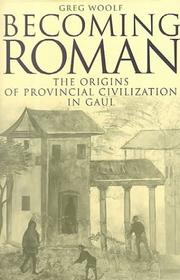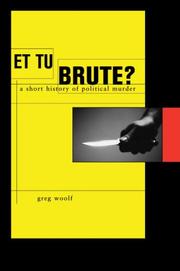| Listing 1 - 10 of 26 | << page >> |
Sort by
|
Book
ISBN: 9780199603084 0199603081 Year: 2012 Publisher: Oxford Oxford University Press
Abstract | Keywords | Export | Availability | Bookmark
 Loading...
Loading...Choose an application
- Reference Manager
- EndNote
- RefWorks (Direct export to RefWorks)
Roman history --- anno 1-499 --- Rome --- History --- Histoire

ISBN: 0521827752 9780521827751 Year: 2003 Volume: *9 Publisher: Cambridge Cambridge University Press
Abstract | Keywords | Export | Availability | Bookmark
 Loading...
Loading...Choose an application
- Reference Manager
- EndNote
- RefWorks (Direct export to RefWorks)
Roman history --- Rome --- Civilization --- History --- Civilisation --- Histoire --- Civilization. --- History. --- Rome - History --- Rome - Civilization

ISBN: 0521414458 0521789826 0511518617 0511880189 9780521414456 9780511518614 9780521789820 Year: 1998 Publisher: Cambridge Cambridge University Press
Abstract | Keywords | Export | Availability | Bookmark
 Loading...
Loading...Choose an application
- Reference Manager
- EndNote
- RefWorks (Direct export to RefWorks)
This book is a study of the process conventionally termed 'Romanization' through an investigation of the experience of Rome's Gallic provinces in the late Republic and early empire. Beginning with a rejection of the concept of 'Romanization' it describes the nature of Roman power in Gaul and the Romans' own understanding of these changes. Successive chapters then map the chronology and geography of change and offer new interpretations of urbanism, rural civilization, consumption and cult, before concluding with a synoptic view of Gallo-Roman civilization and of the origins of provincial cultures in general. The work draws on literary and archaeological material to make a contribution to the cultural history of the empire which will be of interest to ancient historians, classical archaeologists and all interested in cultural change.
Romans --- Romains --- Cities and towns, Ancient. --- Villes antiques --- Gaul --- Gaule --- Rome --- Civilization --- Roman influences. --- Civilisation --- Influence romaine --- History --- Histoire --- Provinces --- Administration. --- Administration --- Roman provinces --- Roman influences --- Empire, 30 B.C.-284 A.D. --- Arts and Humanities --- Romans - France --- Roman provinces - Administration --- Gaul - Civilization - Roman influences --- State governments --- Geography, Ancient --- Gallia
Book
ISBN: 9781405160735 140516073X 111878510X 1444390791 1282889532 9786612889530 1444390813 Year: 2011 Volume: *2 Publisher: Chichester Wiley-Blackwell
Abstract | Keywords | Export | Availability | Bookmark
 Loading...
Loading...Choose an application
- Reference Manager
- EndNote
- RefWorks (Direct export to RefWorks)
Acculturation --- National characteristics, West European --- Européens --- Rome --- Ethnic relations. --- Cultural policy. --- History --- Relations interethniques --- Politique culturelle --- Histoire --- National characteristics, West European. --- Culture policy. --- Européens --- National characteristics, Western European --- West European national characteristics --- Western European national characteristics --- Culture contact --- Development education --- Civilization --- Culture --- Ethnology --- Assimilation (Sociology) --- Cultural fusion --- Rim --- Roman Empire --- Roman Republic (510-30 B.C.) --- Romi (Empire) --- Byzantine Empire --- Rome (Italy) --- Culture contact (Acculturation)

ISBN: 9780674026841 0674026845 Year: 2007 Publisher: Cambridge, Mass. : Harvard University Press,
Abstract | Keywords | Export | Availability | Bookmark
 Loading...
Loading...Choose an application
- Reference Manager
- EndNote
- RefWorks (Direct export to RefWorks)
"Why did Caesar have to die - and why did his death solve nothing? The plot was confused, the execution bungled, and within hours different versions of the event were circulating. It was the end of republican Rome and the beginning of the Roman Empire - and yet everything about it remains somewhat mysterious." "Beginning with this legendary political assassination, immortalized in art and literature through the ages, Greg Woolf delivers a meditation on Caesar's murder as it echoes down the corridors of history, affective notions and acts of political violence to our day." "Assassins Brutus and Cassius dined with their fiercest enemies within days of the murder - and were then hunted down and killed. After the murder neither conspirators nor Caesar's partisans knew how to react. From these beginnings this book follows the normalization of assassination at Rome, cataloguing the murder of Caesar after Caesar and recording the means, methods, and motives of the perpetrators. How was the Roman Empire so untouched by these events? And how had the Republic contained such violence between friends for so long? Woolf shows how Caesar's death - and the puzzled reactions to it - points back to older ethics of tyrannicide." "When is it justified to kill a head of state? Does extra-judicial execution provide answers worth the cost of the ensuing chaos? Ranging among texts by Cicero, Suetonius, and Seneca, plays by Shakespeare and Corneille, and the ideas of Michel Foucault and Francis Fukuyama, Woolf pursues these questions through the ages. His book tells us not only how, but why, Caesar's vast ghost still holds us spellbound."--Jacket.
Assassination --- Assassinat --- History --- Histoire --- Caesar, Julius --- Assassination. --- Attentat. --- Politischer Mord. --- Mord. --- Politiska mord --- History. --- Histoire. --- historia. --- César <101-44 av. J.-C> - Assassinat. --- César, --- Caesar, Julius. --- Caesar, Gaius Iulius, --- Caesar, Gaius J. --- Caesar, Gaius Iulius. --- Caesar, Gajus Julius, --- Assassinat. --- mord. --- Geschichte (umfassend). --- Geschichte. --- Historia.
Book
ISBN: 9780199775293 019977529X Year: 2012 Publisher: Oxford ; New York : Oxford University Press,
Abstract | Keywords | Export | Availability | Bookmark
 Loading...
Loading...Choose an application
- Reference Manager
- EndNote
- RefWorks (Direct export to RefWorks)
The idea of empire was created in ancient Rome and even today the Roman Empire offers a touchstone for thinking about imperialism. Traces of its monuments, literature, and institutions can be found across Europe, the Near East, and North Africa, and sometimes even further afield. In this work, the author, a historian recounts how this mammoth empire was created, how it was sustained in crisis, and how it shaped the world of its rulers and subjects, a story spanning a millennium and a half of history. The personalities and events of Roman history have become part of the West's cultural lexicon, and the author provides retellings of each of these, from the war with Carthage to Octavian's victory over Cleopatra, from the height of territorial expansion under the emperors Trajan and Hadrian to the founding of Constantinople and the barbarian invasions which resulted in Rome's ultimate collapse. Throughout, he considers the conditions that made Rome's success possible and so durable, covering topics as diverse as ecology, slavery, and religion. He also compares Rome to other ancient empires and to its many later imitators, bringing into vivid relief the Empire's most distinctive and enduring features. As is demonstrated, nobody ever planned to create a state that would last more than a millennium and a half, yet Rome was able, in the end, to survive barbarian migrations, economic collapse and even the conflicts between a series of world religions that had grown up within its borders, in the process generating an image and a myth of empire that is apparently indestructible.
Imperialism --- Imperialism. --- Political science. --- History --- To 1500. --- Rome --- Rome --- Rome (Empire). --- Politics and government --- History
Book
ISBN: 9057645955 Year: 2005 Publisher: Kerkdriel Librero
Abstract | Keywords | Export | Availability | Bookmark
 Loading...
Loading...Choose an application
- Reference Manager
- EndNote
- RefWorks (Direct export to RefWorks)
Ancient history --- Maya's --- Azteken --- Mayacultuur --- religie --- kunst --- mythologie (genre) --- Inca's
Book
ISBN: 9780199664733 0199664730 9780199664740 Year: 2022 Publisher: Oxford Oxford University Press
Abstract | Keywords | Export | Availability | Bookmark
 Loading...
Loading...Choose an application
- Reference Manager
- EndNote
- RefWorks (Direct export to RefWorks)
"This book offer a new account of the ancient cities of the Mediterranean world. We are used to thinking of Athens and Rome and Alexandria as great models of urbanism, and of the ancient world itself as a world of cities. In fact cities came late to this corner of Eurasia and were almost always tiny compared to those of neighbouring regions. Greg Woolf sets the slow growth of ancient cities in the context of our species great urban adventure which began six thousand years ago. He asks why, if as a species we are pre-adapted to live in cities, the Greeks and Romans, and Phoenicians and Etruscans and all their neighbours came so late to urban life. Answering this question involves probing questions of human evolution, of Mediterranean ecology, and of ancient imperialisms. Ancient cities emerged from a mixture of accident and entrepreneurship, from local projects of state building and the whims of kings and generals. The handful of ancient mega-cities will built and sustained at enormous cost and against the ecological odds and collapse as soon as imperial powers lost the will or power to keep them going"--
World history --- Ancient history --- Cities and towns, Ancient --- Urbanization --- Imperialism --- History --- Social aspects
Book
ISBN: 3515134077 9783515134071 Year: 2024 Publisher: Stuttgart Steiner
Abstract | Keywords | Export | Availability | Bookmark
 Loading...
Loading...Choose an application
- Reference Manager
- EndNote
- RefWorks (Direct export to RefWorks)
Cults. --- Religion. --- Experience (Religion) --- Cults --- Religion
Book
ISBN: 9780190687458 0190687452 9780192895172 0192895176 Year: 2022 Publisher: Oxford ; Oxford University Press,
Abstract | Keywords | Export | Availability | Bookmark
 Loading...
Loading...Choose an application
- Reference Manager
- EndNote
- RefWorks (Direct export to RefWorks)
| Listing 1 - 10 of 26 | << page >> |
Sort by
|

 Search
Search Feedback
Feedback About UniCat
About UniCat  Help
Help News
News